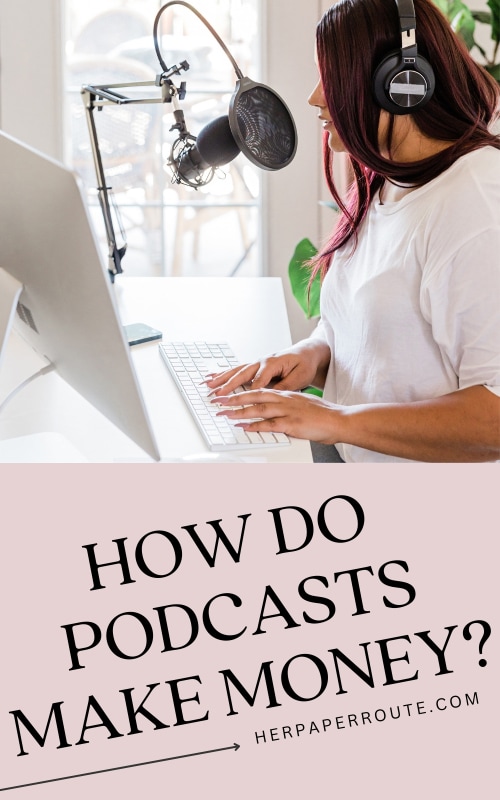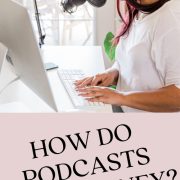How Do Podcasts Make Money? Explained!

As podcasts soar in popularity, there’s no denying that many people are looking to join in the action to monetize their passion and knowledge.
From business owners wanting to grow their customer base and assert their expertise to hobbyists looking to share an interest and boost their income stream, podcasts offer a broad appeal.
As an affiliate partner of various brands and sponsored content, HerPaperRoute may earn commission on qualifying purchases. Disclaimer
It doesn’t come as a surprise that Google reported millions of monthly searches for the word ‘podcast.’
Furthermore, millions of people search for more specific terms such as ‘most popular podcasts,’ ‘trending podcasts,’ or ‘best podcasts’ to unveil those that might tickle their fancy.
With that being said, if you’re curious about the question, ‘how do podcasts make money?’ then you’ve come to the right place. In this guide, we’ll explore a few surprising ways some real-life podcasters are making money.
1. Affiliate Marketing
Also known as performance marketing, it entails receiving a commission when you refer people to other companies. Typically, you’ll earn a percentage of the sale each time someone clicks on the link you provide and buys something.
Affiliate marketing is most ideal when you promote services or products that you’re familiar with, allowing you to discuss them authentically.
For that reason, you’ll notice podcasters talking about services and products they love in a way that makes their listeners want to try them out. You can create an ‘ad’ spot to market an affiliate offer if you lack the following for conventional sponsorships.
Alternatively, you can naturally (in a non-salesy or pushy way) mention products or services that you’re affiliated with as you deliver your regular content.
Related: How to start a podcast.
2. Podcast Sponsorship
When searching for ways to earn an income stream from podcasting, there’s no doubt that a Podcast sponsorship comes to mind. That’s because they’re typically seen as the ‘default’ method of monetization.
However, various podcast ad networks can connect you to marketers. They do the heavy lifting that entails getting the script, finding advertisers, and negotiating rates.
You typically need a larger audience of anywhere between 5,000 and 10,000 listeners monthly to work with these networks.
If you have a more niche or smaller audience and you’d like a sponsor for your podcast, reach out to brands that are an ideal fit for them and your topic.
When you approach these companies, do so with real stories of engagement that you’ve generated and explain in-depth how perfectly this can turn into conversions for their sponsorships.
I recommend starting with local or smaller brands and discussing how they can gain by supporting your podcast. One of the perks of sponsorship is that if you can find one relevant to your topic and audience, you’ll create a valuable, long-term, and lucrative partnership for both parties.
On the flip side, unless you have a hyper-niche subject or getting thousands of downloads, sponsorship may not be as lucrative as you’d expect. You need to reevaluate whether your potential earnings are worth interrupting your listeners.
3. Courses
Popular podcasters create their unique online courses to teach the nuts and bolts of the content they discuss on their podcast. These are excellent ways of teaching a subject straightforwardly, allowing your audience to get a particular outcome upon completing the course.
Having an email list that informs your subscribed listeners of your online course through your podcast and via email can make all the difference.
Another alternative to promote courses is to use a webinar (45 minutes to 1 hour) to demonstrate the value of what you bring and offer the course you have at the end of the session.
These are perfect because you capture your audience’s attention and get to interact with them in real time.
Courses can be invaluable products that are lucrative (three to four-figure sums). Keep in mind that they are time-consuming to put together, which can eat into the time allocated to create your podcast. And based on the subject, courses may require frequent updating.
4. Consulting and Coaching
While these are relatively similar to offering a service, you typically don’t do the work for your customers. Instead, you steer them on the right path toward long-term improvement.
The common industries with lots of coaches and consultants range from teaching, fitness, and diet to business. Pretty much every industry has coaches and consultants.
It’s an easier endeavor to begin compared to creating an entire course since you don’t need to construct anything. Once you have a booking form that can accept the various modes of payment and book a slot, you’re good to go.
You can create meaningful relationships with high-value clients for years through coaching and consulting, ushering in a wealth of opportunities.
Go the extra mile by checking out what your competitors are doing and possibly gain insight into how you can highlight your strengths. After all, your character traits, experiences, and upbringing are uniquely yours.
While there are other coaches in the same field as you, the truth is, nobody is you, and that gives you an edge.
Once you start bringing in coaching clients, listen keenly to know the issues they’re commonly facing and use that knowledge to enhance your business to meet their needs.
Developing close-knit relationships and impacting people’s lives through your coaching and consulting services will prompt your clientele to share your content because they trust and know you on a deeper level.
Using your podcast to sell your services is also an excellent marketing strategy as it allows people to connect with you and get a feel for your personality. It might be your energetic spunk or how well you explain a concept that makes people want to collaborate with you.
Given that it is inherent in human nature to buy from and work with people you trust and like, when you consistently push out top-notch podcast content coupled with selling an aligned service, you’ll be making money before you know it.
On the flip side, one-on-one coaching or consulting solely relies on your availability. That implies less freedom and flexibility when it comes to taking time off to recharge and reset.
5. Write an eBook
As a popular solution to the question, ‘how do podcasts make money?’ a great eBook can be easy to craft, short, and captivating if you’re well-versed in an area. You can publish an eBook on nearly anything.
Once you find a topic that’s right up your alley and write about it, ensure the benefit for your readers is clear as day. For instance, can you pinpoint a problem and provide a viable solution?
Alternatively, you can write a book that sums up the ‘best bits’ from your podcast. On the upside, you can use your podcast episodes as a framework for your book.
However, it’s worth noting that books are low-value which means, one that costs $30 is perceived as pricey despite containing the bulk of an author’s lifetime expertise. Contrarily, a course that contains 20% of the information in the book can sell for nearly twenty times the cost, and nobody would bat an eyelash.
6. Donations and Crowdfunding
These come in handy as a means of supporting you and your podcast. More entertainment-based podcasts are a great way to monetize in this way.
Some platforms make it a walk in the park to offer extra bonuses or content based on the amount of money that your listeners give you as support. Furthermore, they give you free rein to have a separate paid-only RSS feed.
7. Premium Content
There’s no denying that selling premium content is an excellent way to monetize your podcast and scale your business. What sets it apart from memberships is that premium content is more comprehensive and longer than what you’d expect with free content or a membership.
For instance, you can create three weekly podcasts that are free, and the other two are available on premium.
Although the possibilities are endless, here are some of the common ways that a podcast host offers premium content:
- Q&A with the podcast host
- Behind-the-scenes content
- Ad-free RSS feed
- Additional interviews
- Early-access RSS feed
At times, people require tangible content they can interact with to grasp what you’re teaching on your podcast in its entirety. Let’s discuss an example of user-generated content that you can convert into a guide.
Assume you see FAQs in your comments section. That can be your cue to craft an in-depth guide that answers these questions.
Another example is if you’re in a technical industry such as coding or Facebook, you can create a tutorial that demonstrates to your audience how to conduct particular tasks. With premium content, it can be anything you deem fit.
Remember, the magic is in the process, so have fun crafting unique ways to provide additional value to your community for extra bucks every month.
8. Sell a Product
You’re probably scratching your head, puzzled as to what products you’re supposed to sell. You may even be wondering how podcasts make money selling products. Well, for starters, there’s merchandise.
Picture all the revenue that the Harry Potter book makes from sales of the wizardry equipment at Disney theme parks. What about the number of branded Life is Good t-shirts, caps, and clothing?
That shows that merchandise is a great way to monetize your podcast and concurrently market your brand. You can’t deny that those food samples you receive from Costco don’t tempt you to buy the entire package.
The same concept applies to your podcast episodes. Like a product sample, if a customer loves your podcast episode, it’ll leave them yearning for more, and if the products are excellent, they’ll remain loyal to your business.
There’s also the option to sell tangible products. The process is easier with websites that provide ample space to craft customized items, ship, and sell them.
Perhaps you’re a graphic designer or illustrator looking to sell your wall clocks. There’s no better way to extend your podcast than by showcasing your talents to the world.
9. Memberships
You have the option to have your premium content in a subscription-based model, case in point, Netflix.
You can offer subscriptions for different tiers of your premium content, with each level priced differently.
Consider a private Facebook group as a community area for your members to interact exclusively with each other and learn more from you. It’s a platform that most people are familiar with.
Memberships pave the way for flexibility to continue revolutionizing the available content. They are a great way to nurture your audience and form more tight-knit relationships.
It’s a no-brainer that stronger relationships are more bound to stick around in the long term.
10. Sell Yourself as a Podcaster
What if the answer to your question, ‘how do podcasts make money?’ is staring back at you in the mirror? Are there businesses in your niche that lack a podcast?
If so, and you have the expertise, that’s an opportunity to offer one. If you’re a great host with the gift of gab, telling a captivating story is in your forte.
With the production chops to make it appealing, you can make a good living. In this case, your podcast serves as a portfolio, showing the business what you can do.
While marketing your skills as an excellent podcaster is a perfect way to get paid for talking about your passion, on the downside, if someone hires you, you may not have time to run your podcast, depending on the demands of the job.
11. Create an Email List
Most seasoned podcasters admit that coming up with an email list is crucial for monetizing a podcast. Regardless of the strategy you opt for, ensure you have an email list in tow.
Besides helping you build a rapport and strengthen the relationships with your audience, it’ll supplement each of the monetization methods we’ve discussed.
The advantage to this is it’s one of the most tried and tested techniques of staying in contact with your audience and building connections with them. While many other community platforms have come and gone, email is as old as the web.
Building an email list takes time and effort. You need to consistently put out captivating written content for it to work, which may take time away from running your podcast.
» Learn how to build your email list and get your first 1,000 subscribers.
12. Public Speaking
A multitude of podcasters get approached for speaking gigs in their field. It’s only fitting that if someone enjoys the content of your podcast, you’ll come to mind when they need someone to speak at live events and conferences.
Speaking fees can start from a hundred dollars (attendance and free hotel) and run into thousands of dollars or more, depending on the terms of the agreement. Public speaking is an excellent way to boost your authority in addition to getting exposure to a new audience that is likely to a become podcast listeners.
13. Performance, Presentation, and Delivery
How you come across as a podcast creator when you’re behind the microphone can be the make or break when it comes to earning from your podcast. You may have a great message and an interesting topic, but if you lack the skills to deliver the content in a captivating and informative way, boredom will slowly creep in among your listeners, resulting in them tuning out.
Great podcasters have mastered the art of delivery, performance, and presentation, which keeps their listeners coming back for the action.
That doesn’t mean you act like someone else, but keep in mind that your body language is channeled through your vocal inflections and voice in the audio world. Enthusiasm and passion galvanize your audience, so ensure that oozes in your presentation.
There’s always room for improvement, so you should constantly strive to step up your performance.
14. Programmatic Advertising
In layman’s terms, programmatic advertising refers to the marketplace where the automatic selling and buying of podcast advertisements occurs. You can have your programmatic marketplace littered with advertisers ready to automatically deliver target ads to your podcast.
With the flip of a switch, you can deliver relevant ads to your podcast audience. Programmatic ads help podcasters sell 100% of their inventory to international and domestic markets alike.
If 30% of podcast listeners are from France, for example, this type of podcast advertising allows you to serve them particular ads for that region.
How Do Podcasts Make Money – Conclusion
Now that you have some fresh ideas of how podcasts make money, keep in mind that the driving force of your podcast monetization should be cultivating your podcast listener community and sharing your passion with the world.
When you remember that and stay consistent, you’ll be pleasantly surprised by the money that flows from your podcast network.
In addition to making money with podcasts, there are several other ways you can make extra money online. Check out how to make money online for beginners to get started.
Related Articles:
- Guide for Making Money on eBay
- How to Make Money on Fiverr Using Skills You Already Have
- Numerous Ways to Make Money Online Using Amazon

Follow along on Instagram!










